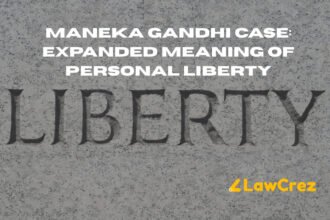Introduction – Maneka Gandhi Case
The Maneka Gandhi case (1978) is one of the most transformative judgments in Indian constitutional history. Decided by a seven-judge bench of the Supreme Court of India, it revolutionized the interpretation of Article 21 by expanding the meaning of “personal liberty.” This case marked the beginning of a new era of judicial activism and constitutional humanism, ensuring that no individual can be deprived of life or liberty except through a fair, just, and reasonable procedure.
Background of the Case
In 1976, Maneka Gandhi, a journalist and the daughter-in-law of former Prime Minister Indira Gandhi, was issued a notice by the Regional Passport Officer, New Delhi, under Section 10(3)(c) of the Passport Act, 1967, ordering her to surrender her passport “in public interest.” No reasons were provided for the order.
Maneka Gandhi challenged this arbitrary action, claiming that it violated her Fundamental Rights under:
- Article 14 (Right to Equality),
- Article 19(1)(a) (Freedom of Speech), and
- Article 21 (Right to Life and Personal Liberty).
Key Facts
- Petitioner: Maneka Gandhi
- Respondent: Union of India
- Citation: AIR 1978 SC 597; (1978) 1 SCC 248
- Bench Strength: 7 Judges
- Judgment Date: 25 January 1978
- Relevant Provisions: Articles 14, 19, 21; Passport Act, 1967
At its core, the case questioned whether the “procedure established by law” in Article 21 could be arbitrary, or whether it must also be fair and reasonable in substance and procedure.
Legal Issues Involved
- Whether the impounding of a passport without providing reasons violates Articles 14, 19, and 21.
- Whether “procedure established by law” in Article 21 means any procedure enacted by the legislature or one that is just, fair, and reasonable.
- Whether Fundamental Rights are mutually exclusive or interconnected.
Arguments Presented
Petitioner’s Arguments
- The impounding of her passport without a hearing or reason violated the principles of natural justice.
- The procedure under the Passport Act was arbitrary and unreasonable, infringing Article 21.
- Articles 14, 19, and 21 form an interconnected trinity, and a law must satisfy all three to be constitutional.
Respondent’s Arguments
- The Passport Act, 1967 was a validly enacted law; therefore, actions under it were within the government’s authority.
- “Procedure established by law” meant any procedure prescribed by legislation, regardless of fairness.
- National interest justified the restriction imposed.
Judgment and Reasoning
The Maneka Gandhi case was decided in favor of the petitioner, fundamentally transforming the scope of Article 21. The Court ruled that:
“The procedure established by law” must be right, just, and fair, not arbitrary, fanciful, or oppressive. Any law violating this principle would be void under Article 21.
Key Holdings
- Expanded interpretation of Article 21: The term “personal liberty” covers a wide range of rights that constitute the personal freedom of individuals.
- Interrelationship of Articles 14, 19, and 21: These Articles are not mutually exclusive but form a golden triangle protecting human rights.
- Natural justice as a constitutional guarantee: The Court held that fair procedure and reasoned decisions are implicit in Article 21.
Judicial Philosophy: From A.K. Gopalan to Maneka Gandhi
Earlier, in A.K. Gopalan v. State of Madras (1950), the Supreme Court had held that Fundamental Rights were separate silos—a law violating Article 21 need not be tested under Article 19 or 14.
The Maneka Gandhi case overruled this narrow approach, introducing a liberal and humanistic interpretation. It aligned Indian constitutional law closer to the American concept of “due process of law”, thus expanding judicial protection of civil liberties.
Impact and Significance
- Broadened scope of Fundamental Rights: Article 21 became the foundation for various derivative rights—right to privacy, right to travel abroad, right to clean environment, right to legal aid, etc.
- Judicial Activism: The judgment initiated an era of Public Interest Litigations (PILs), empowering courts to protect social and economic rights.
- Accountability of the State: Governmental actions were now subject to reasonableness and fairness tests under Article 14 and 21.
- Influence on International Jurisprudence: The decision reflected global constitutional trends that emphasize human dignity and procedural fairness.
Comparative Perspective
Internationally, the Maneka Gandhi case resonates with:
- USA: Rochin v. California (1952) – where the U.S. Supreme Court held that state action “shocking the conscience” violates due process.
- UK: Ridge v. Baldwin (1964) – which emphasized natural justice as part of administrative fairness.
This comparative approach demonstrates how India’s Article 21 evolved toward universal standards of justice and liberty.
Conclusion
The Maneka Gandhi case redefined the constitutional vision of liberty in India. It ensured that personal liberty is not subject to arbitrary state action and that every law depriving a person of such liberty must pass the tests of reasonableness, fairness, and non-arbitrariness. For every law student and practitioner, it is a reminder that the spirit of the Constitution lies in protecting the dignity of the individual.
Also Read
Online Legal Internship Research & Writing Opportunity at Sakshar Law Associates; Apply Now
Supreme Court’s Big Call: Judicial Officers with 7 Years’ Combined Experience Can Now Apply for District Judge Posts (Legal News)







